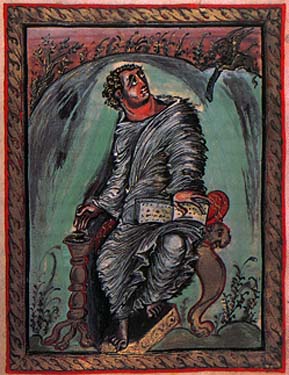Ebbo facts for kids
Ebbo or Ebo (around 775 – March 20, 851) was an important church leader. He served as the Archbishop of Rheims in France twice. His first time was from 816 to 835, and then again from 840 to 841.
Ebbo was born in Germany. He was a serf, which meant he worked on the land owned by Charlemagne, a famous emperor. Ebbo was educated at Charlemagne's court. Later, he became a librarian and advisor to Louis the Pious. Louis was Charlemagne's son and the king of Aquitaine. When Louis became the Holy Roman Emperor, he chose Ebbo to be the Archbishop of Rheims.
Contents
Spreading Christianity
Ebbo played a big part in spreading Christianity in northern Europe. In 822, Emperor Louis asked him to go to Rome. There, Ebbo met Pope Pascal I. He asked the Pope to let him preach in the North.
The Pope agreed, and Ebbo was allowed to teach the Danes. In 823, Ebbo traveled to Denmark with two other bishops. Their trips had little success at first. Another missionary named Ansgar had more success later on.
Challenges and Changes
Ebbo faced many challenges during his time. Emperor Louis the Pious had three sons from his first marriage. These sons were Lothair, Louis, and Pepin. In 830, they rebelled against their father. Ebbo stayed loyal to Emperor Louis at first.
However, in 833, Ebbo joined the sons' rebellion. On November 13, he led a meeting of church leaders in Soissons. At this meeting, they removed Emperor Louis from power. They also forced him to admit to many crimes he had not committed. As a reward, Lothair gave Ebbo a large abbey.

Ebbo then became a loyal follower of Lothair. He stayed with Lothair even after Emperor Louis got his power back in March 834. But when Lothair had to escape to Italy, Ebbo was too sick to follow. He was suffering from gout, a painful joint condition.
Ebbo found shelter with a hermit in Paris. Soon, Emperor Louis's men found him. They put him in prison at the Abbey of Fulda. The events of the previous year were quickly reversed.
Ebbo's Public Confession
In February 835, Ebbo was brought to a meeting of bishops. There, in front of 43 bishops, he had to admit something important. He said that Emperor Louis had never committed the crimes he had accused him of. Ebbo publicly took back his words from a church pulpit in Mainz on February 28. After this, the bishops removed him from his position. He was sent back to prison at Fulda. Later, he was given to other bishops to watch over.
Return and Final Years
Ebbo was made Archbishop of Rheims again when Emperor Louis died. This happened in December 840, and Lothair became the new emperor. However, a year later, Charles the Bald took control of France. Ebbo was removed from his position for a second time.
A new archbishop named Hincmar was appointed in 845. Hincmar refused to accept any of Ebbo's actions during his second time as archbishop. A church council in 853 declared Ebbo's actions invalid.
Ebbo went to Lothair's court, but Pope Sergius II did not agree to make him archbishop again. When Lothair no longer needed Ebbo, he had to leave that court. He then went to the court of Louis the German. Louis made Ebbo the Bishop of Hildesheim in Germany. Ebbo served in this role from about 845 to 847. He died in Hildesheim on March 20, 851.
Ebbo's Legacy
Ebbo wrote a defense of his reinstatement called Apologeticum Ebbonis. He also gathered talented artists in a place called Hautvillers. These artists changed Carolingian art and started a new art movement. This group became known as the Reims school.
Their most famous work is the beautiful Gospel Book of Ebbo. This book shows their unique artistic style. Ebbo's influence on the Carolingian Renaissance was huge, especially in art and book decoration.
| Catholic Church titles | ||
|---|---|---|
| Preceded by Wulfaire |
Archbishop of Reims 816–835 |
Succeeded by Hincmar |
| Preceded by Rembert |
Bishop of Hildesheim 835–847 |
Succeeded by Altfrid |
 | William M. Jackson |
 | Juan E. Gilbert |
 | Neil deGrasse Tyson |

